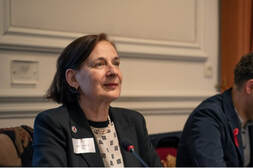 Photo by Morgan Muller
Photo by Morgan Muller On the occasion of World Aids Day the ‘Parliamentarians for the 2030 Agenda’ organized a lunch-time conversation on the impact of criminalisation of HIV and key populations on the HIV-response. Evidence shows that an overly broad criminalisation of HIV non-disclosure, exposure or transmission with no intent to harm, undermines public health. Why is that?
 Jantine Jacobi, UNAIDS representative to the EU. Photo by Morgan Muller
Jantine Jacobi, UNAIDS representative to the EU. Photo by Morgan Muller Criminalisation undermines public health
Criminalisation creates a false sense of security among those who are HIV-negative or who do not know their status, by believing that the law can protect people from exposure to HIV. Laws criminalising HIV non-disclosure also undermine trust between health professionals, service providers and their patients, and deter people from talking openly about their sexual practices and seeking advice for fear that what they say could be used against them. Criminalisation is also know to deter access to HIV prevention, testing, treatment and care for fear of legal ramifications. Last but not least, criminalisation reinforces stigma and discrimination against people living with HIV.
Most countries still criminalise
134 countries in the world are criminalising HIV transmission, exposure or non-disclosure, either through specific or general criminal law, including Belgium. However, of the thousands of known prosecutions worldwide only a tiny minority have involved someone who what the intention to infect another person with HIV. Given the evidence, and how it undermines public health, UNAIDS, the HIV Justice Network, Sensoa and many other HIV experts have called upon countries to do away with laws that are so broad that they create more problems than they seek to solve. Only deliberate transmission with the intent to harm should be criminalized.
Criminalising key populations impacts the HIV-response worldwide
The criminalisation of so-called key populations also greatly impacts the global HIV-response. 70 countries worldwide criminalise same-sex relations. According to UNAIDS, criminalisation of same-sex relations increases the risk of an HIV-infection with almost 8 times. The criminalisation of sex work increase the risk of an HIV-infection by 7. The criminalisation of drug use equally impedes HIV-prevention and treatment. Due to acute under-funding of responses for key populations, members of key populations struggle to obtain adequate access to services in many settings. The numbers of new infections among these populations have been going up in those regions where the biggest funding gaps are found, including the Middle East and North Africa region, Asia-Pacific and Eastern-Europe and Central Asia. This shows the challenges criminalisation poses in ending HIV and the need to step-up efforts globally, regionally and nationally.
Bringing about change
Members of parliament are key in changing harmful legislation and advancing the human rights of people living with HIV and key populations. They can do so by building their knowledge on criminalisation and its effects, exchanging with their peers nationally and internationally, and engaging in legislative work. In Belgium the ongoing reform of the penal code offers an opportunity to do so, and take out existing legal loopholes.
Guest speakers at the event included Jantine Jacobi, UNAIDS-representative to the European Union in Brussels, Cesar Mombunza, of CONERELA from DRC, Edwin J Bernard, the Executive Director, HIV Justice Network and Sandra Van den Eynde, policy advisor on STI and HIV at Sensoa, Flemish expertise center Sexual Health.
Criminalisation creates a false sense of security among those who are HIV-negative or who do not know their status, by believing that the law can protect people from exposure to HIV. Laws criminalising HIV non-disclosure also undermine trust between health professionals, service providers and their patients, and deter people from talking openly about their sexual practices and seeking advice for fear that what they say could be used against them. Criminalisation is also know to deter access to HIV prevention, testing, treatment and care for fear of legal ramifications. Last but not least, criminalisation reinforces stigma and discrimination against people living with HIV.
Most countries still criminalise
134 countries in the world are criminalising HIV transmission, exposure or non-disclosure, either through specific or general criminal law, including Belgium. However, of the thousands of known prosecutions worldwide only a tiny minority have involved someone who what the intention to infect another person with HIV. Given the evidence, and how it undermines public health, UNAIDS, the HIV Justice Network, Sensoa and many other HIV experts have called upon countries to do away with laws that are so broad that they create more problems than they seek to solve. Only deliberate transmission with the intent to harm should be criminalized.
Criminalising key populations impacts the HIV-response worldwide
The criminalisation of so-called key populations also greatly impacts the global HIV-response. 70 countries worldwide criminalise same-sex relations. According to UNAIDS, criminalisation of same-sex relations increases the risk of an HIV-infection with almost 8 times. The criminalisation of sex work increase the risk of an HIV-infection by 7. The criminalisation of drug use equally impedes HIV-prevention and treatment. Due to acute under-funding of responses for key populations, members of key populations struggle to obtain adequate access to services in many settings. The numbers of new infections among these populations have been going up in those regions where the biggest funding gaps are found, including the Middle East and North Africa region, Asia-Pacific and Eastern-Europe and Central Asia. This shows the challenges criminalisation poses in ending HIV and the need to step-up efforts globally, regionally and nationally.
Bringing about change
Members of parliament are key in changing harmful legislation and advancing the human rights of people living with HIV and key populations. They can do so by building their knowledge on criminalisation and its effects, exchanging with their peers nationally and internationally, and engaging in legislative work. In Belgium the ongoing reform of the penal code offers an opportunity to do so, and take out existing legal loopholes.
Guest speakers at the event included Jantine Jacobi, UNAIDS-representative to the European Union in Brussels, Cesar Mombunza, of CONERELA from DRC, Edwin J Bernard, the Executive Director, HIV Justice Network and Sandra Van den Eynde, policy advisor on STI and HIV at Sensoa, Flemish expertise center Sexual Health.

 RSS Feed
RSS Feed